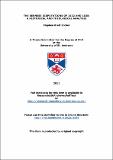Files in this item
The Bernese disputations of 1532 and 1538 : a historical and theological analysis
Item metadata
| dc.contributor.advisor | Gordon, Bruce | |
| dc.contributor.author | Eccher, Stephen Brett | |
| dc.coverage.spatial | xi, 201 | en_US |
| dc.date.accessioned | 2012-04-19T13:25:39Z | |
| dc.date.available | 2012-04-19T13:25:39Z | |
| dc.date.issued | 2011-11 | |
| dc.identifier.uri | https://hdl.handle.net/10023/2566 | |
| dc.description.abstract | Given the relative paucity of treatments relating to both the 1532 and 1538 Bern Gespräche, alongside a growing historiography which has offered a clearer understanding of the backdrop around which these two debates were held, the focus of this research project will be to provide a comparative analysis of the recorded dialogues from the debates at Bern. This ecclesiologically focused comparison aims to discern whether the debate relating to the nature of the church at the 1538 session was merely a redundant exercise and continuation of the earlier 1532 disputation or whether the latter debate offered anything substantively new to the ongoing religious dialogue between these two groups. Furthermore, all of the respective views on the nature of the church manifest in these debates will be examined in light of the preceding Anabaptist/Reformed dialogue of the period to determine their place contextually. Having embarked upon the aforementioned goals several conclusions may be definitively drawn. First, the major ecclesiological suppositions expressed by both the Anabaptist and Reformed participants at the 1538 debate were, in fact, retained using the same core theological elements employed by their predecessors at the 1532 debate. Yet, despite this striking similarity, the independent nature of these debates must also be acknowledged. This may primarily be found in that both groups expressed their retained ecclesiologies with notable variation in things such as language, argumentative content, biblical corroboration, and illustrative evidence. Finally, both the similar and independent nature of these events will be shown to have been largely derived from the Anabaptist/Reformed dialogue already begun as the Swiss Brethren movement emerged from under Zwingli’s reform efforts in Zürich. Each of these conclusions should help to paint a more accurate portrait of not only what was accomplished through these debates, but where each stands contextually during the period. | en_US |
| dc.language.iso | en | en_US |
| dc.publisher | University of St Andrews | |
| dc.subject.lcc | BR410.E3 | |
| dc.subject.lcsh | Religious disputations--Switzerland--Berne | en_US |
| dc.subject.lcsh | Reformation--Switzerland | en_US |
| dc.subject.lcsh | Switzerland--Church history | en_US |
| dc.title | The Bernese disputations of 1532 and 1538 : a historical and theological analysis | en_US |
| dc.type | Thesis | en_US |
| dc.type.qualificationlevel | Doctoral | en_US |
| dc.type.qualificationname | PhD Doctor of Philosophy | en_US |
| dc.publisher.institution | The University of St Andrews | en_US |
This item appears in the following Collection(s)
Items in the St Andrews Research Repository are protected by copyright, with all rights reserved, unless otherwise indicated.

